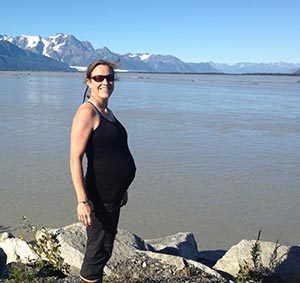
Kate Morse was nine years old and living in Pennsylvania when the Exxon Valdez hit Bligh Reef in 1989. Although she didn’t directly experience the spill personally, she now works to bring the spill to life for a new generation.
Morse has been the Program Director for Cordova’s Copper River Watershed Project since 2008. The organization is based in Cordova but does work throughout the Copper River watershed drainage area, which includes not only Cordova, but Glennallen, Kenny Lake, Mentasta Lake, and Paxson. Morse says the area is about the size of West Virginia, and the population of the region depends on healthy salmon runs.
“It takes an entire watershed to support healthy salmon populations due to their complex life cycle from salt to fresh water and back to salt water again,” says Morse. “Our education programs really aim at getting people to see themselves as part of a watershed community, rather than just the stream in their backyard.”
She says her organization tracks the council’s projects closely because the Trans-Alaska pipeline runs through the Copper River basin.
“There are major river systems in the area,” Morse says. “The prospect of removing oil from a glacial river, how the oil would contaminate the entire water column and the glacial sediments, it would be impossible to clean it up.”
“Prevention is definitely the key.”
Connecting a new generation to spill prevention and preparedness
The message of prevention is emphasized in much of Morse’s work.
“As a trip leader and an educator, and as a volunteer for the council, I’ve taken the lead on education about the oil spill event and the resulting checks and balances in place, such as the council, to make sure this kind of incident doesn’t happen again.”
She has led expeditions for middle and high school youth coordinated by both Alaska Geographic and the Copper River Stewardship program. During these trips, Morse connects a new generation to the story of the Exxon Valdez.
“I feel like it’s really important to help be a connection to the generation that was born after the spill happened, so that history doesn’t repeat itself,” Morse says. “I do what I can to capture those experiences and emotions and lessons learned from those who had the unfortunate experience of being here during that time.”
“I make sure students understand how far things have come related to what things were like at the time of the spill.”
“In the past two years, the most powerful way that I’ve been able to do that is not to try to retell the stories myself, but to use the voices of the people themselves through the use of the book The Spill and Project Jukebox,” Morse says.
Project Jukebox is an archive of audio and video recordings preserved as part of the Oral History Program at the University of Alaska Fairbanks. In 2014, the council partnered with the university to create an Exxon Valdez oil spill portion of the archive.
Cordova students see their parents and other community members taking part in Alyeska’s program to train fishermen and other mariners to response to oil spills, but they don’t really know how or why the program came to be.
“When they hear the stories of the fishermen who were sidelined and told they were going to be arrested for collecting oil in buckets, it provides a greater context for the response program that’s in place.”
She says these stories connect the students to the spill in a personal way.
“Being in Prince William Sound and seeing the whales and sea lions and witnessing the life out there today, while at the same time reading or listening to firsthand stories about what it was like covered with oil, when the water sounded ‘dead’, when there were carcasses littering the beaches, when there was chaos trying to coordinate cleanup, it’s really a powerful combination. It helps make those experiences real without having to have this next generation experience the oil spill themselves.”
Working with the council
Morse’s volunteer work with the council’s Information and Education Committee relates to her personal passion.
“There are really diverse experiences and perspectives on the committee, and people share them in non-confrontational ways,” she says. “It’s a very informative process where no one is dominant or driving a certain agenda. It’s a constantly moving, flexible group, and I am constantly learning.”
Morse studied collaborative resource management in graduate school. She says the committee, and the council, is an important organization and she has been impressed with how the group functions overall.
“I studied collaborative processes and ways to bring together diverse stakeholders communities,” Morse says. “The challenges associated with maintaining communications, reducing conflict, it is a very challenging concept to successfully achieve when the public is involved. That kind of diverse stakeholder involvement has a lot of things going against it and I think the council works really hard to overcome those challenges and does so rather successfully.”